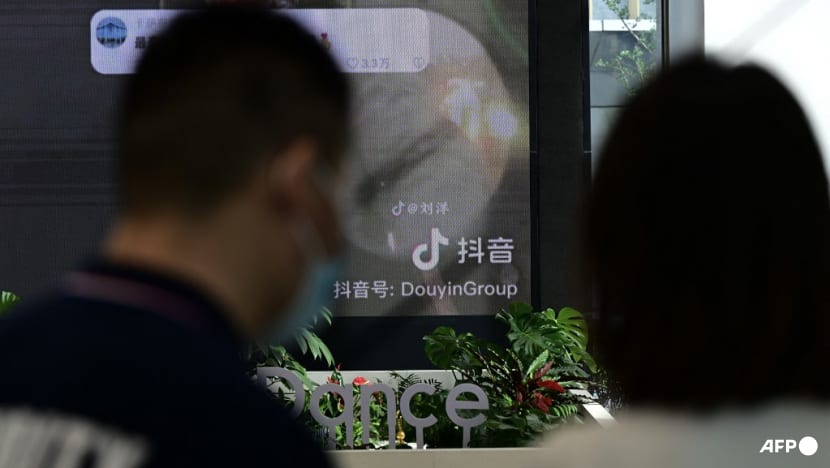From ‘life coaches’ to ‘spiritual healing gurus’: Fake experts being targeted on China’s version of TikTok
Owned by Bytedance, Douyin is hugely popular in China with around 755 million monthly active users. Its latest clampdown is in line with an ongoing government campaign to clean up national cyberspace.

The Douyin Group logo is seen at the ByteDance office in Shanghai on Jun 27, 2023. (Photo: AFP/Pedro Pardo)

This audio is generated by an AI tool.
SINGAPORE: China’s leading short video platform Douyin is cracking down on the accounts of fake experts and “self-proclaimed masters”, amid a wider cyberspace cleanup being undertaken by the government.
Announcing the clampdown on Monday (Jul 22) in a WeChat statement, the domestic sister app of TikTok said it recently discovered a small number of accounts with “fake personas”.
Claiming to be executives from famous companies, experts or “self-proclaimed masters”, these personalities gain the trust of Douyin users before directing them to third-party platforms to make a profit.
“Such behaviour violates (Douyin’s) platform rules and may cause other users to suffer financial and emotional losses,” the platform warned. Douyin had about 755 million monthly active users as of February 2024, according to Statista.
Douyin said on Monday that it has always been committed to maintaining a “clean, safe and trustworthy environment”. It urged the offending accounts to promptly “correct” or delete inaccurate or misleading information, or provide credible proof of their claims.
If not, they face possible account bans, a reset of their nicknames or personal profiles, as well as videos being removed.
Offending accounts may also have their monetisation permissions cancelled, removed from search listings, or banned from gaining new followers.
“MASTERS OF LOST LOVE RECOVERY”
Douyin gave examples of conduct by these “fake expert” accounts that violate its rules.
For instance, users who claim to have professional achievements but do not or cannot provide verifiable proof, such as self-proclaimed senior executives who claim to be the “director of a large factory” or executives with “20 years of experiences in enterprises.
Also in the crosshairs - accounts with “unverifiable performances”. For example, they would claim to have “successfully helped more than 300 companies double their sales”, helped “1 million mothers get rich while working part-time”, or “brought 5,000 couples together”, Douyin stated.
Accounts run by “self-proclaimed masters” with unverifiable titles or titles not “widely recognised by society” may also see themselves banned.
These are people who claim to be the “love and marriage experts”, “life coaches”, “spiritual healing gurus” as well as “masters of lost love recovery”, Douyin pointed out.
State media reports on the short video platform’s latest move drew attention to a notable case in February. Then, a career influencer with tens of millions of online followers sold about 250,000 sets of artificial intelligence (AI) learning courses, the state-run Global Times reported.
Dubbed the “Chinese AI godfather”, Li Yizhou leveraged on the learning craze after OpenAI launched its generative AI model Sora, generating sales of about 50 million yuan (US$6.87 million).
But it later emerged that while Li was previously enrolled with Tsinghua University’s Academy of Arts & Design, his expertise had nothing to do with AI or deep learning.
Coupled with his exaggerated claims and the low quality of the courses, a wave of refund demands ensued, along with numerous copyright disputes, Global Times reported.
Li’s social media accounts were eventually banned and the courses removed.
Douyin’s latest move is in line with a years-long national effort to clean up Chinese cyberspace, running the gamut from targeting AI-generated content to shutting down wealth-flaunting influencers.
In one of the latest steps, authorities announced new controls on Internet content on Jul 13, taking aim at video apps and social media platforms to purge material deemed harmful to children.
In June, the Ministry of Public Security called on agencies to punish people who pretend to be government officials to defraud investors by selling fake official seals.
The rackets had “severely damaged the image of the Communist Party and the government and disrupted social and economic order”, the South China Morning Post reported, quoting a statement posted to the ministry’s website.














